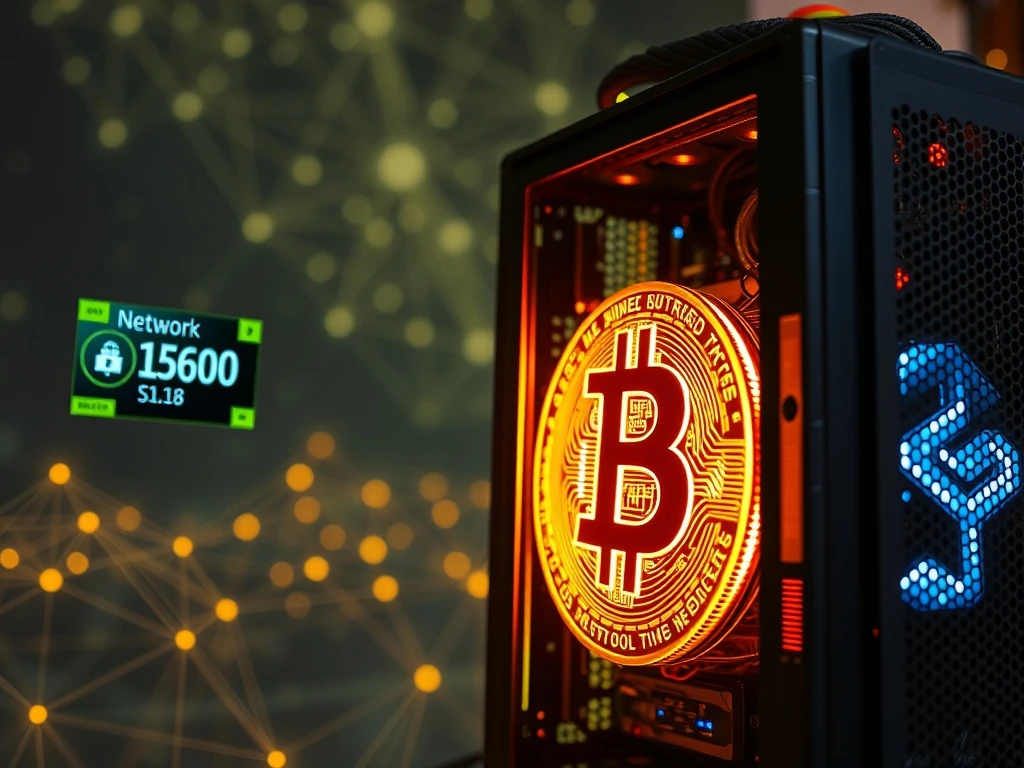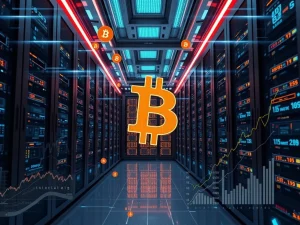Solo Bitcoin Mining Triumphs: Miner Unlocks Remarkable $347K Block Reward

Imagine hitting the jackpot in the digital realm. This dream recently became reality for one individual. A solo Bitcoin miner achieved a truly remarkable feat. They solved block 920,440 entirely on their own. This win resulted in a substantial payout. It highlights the thrilling potential of **solo Bitcoin mining**.
This miner pocketed a staggering $347,455. This amount included the standard block reward and transaction fees. It truly demonstrates ‘pure self-sovereignty in action.’ This event resonates deeply within the cryptocurrency community. It offers a powerful testament to Bitcoin’s foundational principles. For many, it underscores the ongoing pursuit of **Bitcoin decentralization**.
The Remarkable Feat of Solo Bitcoin Mining
The cryptocurrency world recently celebrated a significant victory. A lone miner won the “Bitcoin mining lottery.” This individual secured a **block reward** worth over $347,000. Specifically, they earned 3.125 Bitcoin (BTC) plus an additional 0.016 BTC in transaction fees. This momentous event occurred at block height 920,440. It happened on Thursday at 7:32 PM UTC, according to Mempool.space data. Such wins are not entirely unprecedented. However, this particular instance stands out. The miner achieved this success by running their own solo mining pool. They did not rely on collective hash power from larger groups. This approach is far less common. It represents a more challenging path to success.
Mining Bitcoin typically involves joining large pools. These pools combine the computational power of many miners. This strategy increases the chances of solving a block. When a pool solves a block, members share the **block reward**. Conversely, **solo Bitcoin mining** means an individual dedicates their entire hash power. They attempt to solve a block alone. This method requires immense luck and significant computational resources. The probability of success for a solo miner is extremely low. Therefore, this recent win is particularly impressive. It underscores the potential for extraordinary individual achievement within the network.
Powering Decentralization: The Role of Umbrel Server
This solo miner’s success offers more than just a financial windfall. It also represents a major win for **Bitcoin decentralization**. Umbrel, a prominent Bitcoin node infrastructure company, confirmed the miner’s victory. They noted the miner used the Public Pool Bitcoin mining pool. Crucially, the miner operated their own mining pool. This pool was hosted on an **Umbrel server**. This setup eliminated intermediaries. It removed the need for third-party involvement. Umbrel emphasized this point: “No middlemen. No third-parties. Just pure self-sovereignty in action.” This statement captures the essence of Bitcoin’s original vision. The Bitcoin Bazaar X account echoed this sentiment. They stated, “A solo block has been mined by a solominer, mining on his own mining pool, hosted on an Umbrel Server. Total sovereignty. We need more of this.”
The increasing number of solo miners solving blocks directly benefits Bitcoin’s decentralized nature. It empowers smaller participants. They can compete more effectively against large industrial-scale mining operations. Many of these larger entities are publicly traded companies. They command vast resources. Their dominance can centralize hash power. However, solo miners, especially those leveraging tools like the **Umbrel server**, inject diversity. They distribute the network’s computational power more broadly. This distribution makes the network more resilient. It reduces reliance on a few dominant players. Consequently, it strengthens the network against potential attacks or censorship. This outcome aligns perfectly with Bitcoin’s core design principles. It fosters a truly distributed and robust system.
Understanding the Lucrative Bitcoin Block Reward
Every time a miner successfully solves a block, they receive a **block reward**. This reward serves as an incentive. It encourages individuals and entities to dedicate their computational resources. These resources secure the Bitcoin network. The current reward structure includes newly minted Bitcoin. It also incorporates transaction fees from all transactions within that block. For block 920,440, the solo miner received 3.125 BTC as the base reward. Additionally, they collected 0.016 BTC in transaction fees. This combination totaled approximately $347,455 at the time of the win. The value of this reward fluctuates with Bitcoin’s market price. This makes such wins highly coveted. It turns mining into a form of digital gold rush.
The **block reward** is a fundamental component of Bitcoin’s monetary policy. It undergoes periodic reductions. These reductions are known as halvings. Historically, these events occur roughly every four years. They halve the base BTC reward. This mechanism controls Bitcoin’s supply. It ensures its scarcity. For solo miners, a halving means a smaller base reward. However, the potential for transaction fees can still make a win significant. This particular win highlights the continued profitability of mining. It also showcases the network’s robust security model. Miners contribute to this security by validating transactions. They add new blocks to the blockchain. In return, they receive these valuable rewards. This system incentivizes participation. It maintains the integrity of the entire Bitcoin ecosystem.
Boosting Accessibility with Modern Crypto Mining Hardware
The narrative of solo mining success gains further depth. It coincides with the emergence of more accessible **crypto mining hardware**. Recent years have seen a rise in smaller, more affordable mining devices. These machines contrast sharply with large, industrial-scale Application-Specific Integrated Circuits (ASICs). For example, Bitaxes offers pocket-sized miners. These devices range in price from $155 to over $600. Their cost depends on their terahash-per-second capacity. While these compact machines contribute a relatively small portion to Bitcoin’s overall hash rate, their impact is significant. They lower the barrier to entry for aspiring miners. This accessibility fosters greater participation. It helps democratize the mining process.
Many of these smaller **crypto mining hardware** units are open-sourced. This approach directly challenges the “secrecy and exclusivity” often associated with larger Bitcoin ASICs. These industrial machines typically use closed-source technology. A BitMaker spokesperson noted this trend in 2023. They told Crypto News Insights that open-sourcing combats the dominance of a few manufacturers. It promotes transparency and innovation. This move allows individuals to understand and even modify their mining equipment. It further reinforces the spirit of self-sovereignty. As more individuals acquire and operate these smaller devices, the collective hash rate benefits. It contributes to the network’s overall security. Moreover, it strengthens the argument for a truly decentralized mining landscape. This development makes Bitcoin mining more approachable for the average enthusiast.
The Future of Bitcoin Mining and Decentralization
The success of this solo miner is not an isolated incident. It represents a growing trend. More individuals are embracing **solo Bitcoin mining**. They are doing so with greater enthusiasm. This shift is crucial for the long-term health of the Bitcoin network. It ensures that power remains distributed. It prevents excessive concentration in the hands of a few large entities. Tools like the **Umbrel server** play a vital role in this evolution. They empower individuals. They provide the means to participate directly. They enable miners to control their own nodes and mining operations. This direct involvement is fundamental to Bitcoin’s ethos.
Looking ahead, the continued development of affordable **crypto mining hardware** will be key. These innovations will further broaden participation. They will enable more people to contribute to network security. This accessibility directly supports **Bitcoin decentralization**. Each solo miner, regardless of their individual hash power, adds to the network’s robustness. Their efforts contribute to a more resilient and censorship-resistant system. This recent $347K **block reward** serves as a powerful reminder. Bitcoin’s original vision of self-sovereignty and decentralization remains vibrant. It continues to inspire individual triumphs. It shapes the future of digital finance. This ongoing evolution promises a more inclusive and distributed global financial infrastructure.








